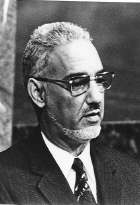| Mauritania Table of Contents
The greatest challenge to national unity was Mauritania's heterogeneous population. As in all the Sahelian states, Mauritania's southern regions were inhabited mainly by peasants who belonged racially and culturally to black Africa, while the population of its northern regions were desert nomads who identified with the Arab world. At independence, Mauritania's estimated 1.5 to 1.8 million people could be divided into three groups: one-third of the inhabitants were both racially and ethnically Maures; another third, although racially black or mixed Maure-black, were ethnically Maures (this group of black Maures was essentially a slave class until 1980, when slavery was abolished); and the remaining third were racially and ethnically black, resembling in many respects the populations in neighboring Senegal and Mali. Achievement of national unity was impeded by the desires of some Maures, mostly from the northern sections of the country, to unite with Morocco, and the countervailing wishes of many blacks to secede from Mauritania and join the Mali Federation. The defeat of the Mauritanian Entente and Babana by the Mauritanian Progressive Union in the elections of 1951 and 1956, which established the Mauritanian Progressive Union's dominance, led Babana and several of his followers in the summer of 1956 to flee to Morocco, where Babana became head of the National Council of Mauritanian Resistance. With the support of many Maures inside Mauritania, this group supported Morocco's claims to Mauritania and, by extension, Morocco's opposition to Mauritanian independence. To counterbalance the pro-Moroccan sympathies of many Maures, southern minority groups formed a regional party, the Gorgol Democratic Bloc, committed to the prevention of a Maghribi union and to the maintenance of close ties with black African countries. Intellectuals from various black minorities met in Dakar, Senegal, in 1957 and created the Union of the Inhabitants of the River Valley to fight for minority rights against Maure domination. Further impeding national unity was the inclusion of French officials in the key ministries of finance and economic planning. Daddah was educated in France and, having just returned to Mauritania to form the government, had not been involved in the rivalries and struggle for power. His consequent congeniality toward the French alienated the Association of Mauritanian Youth, an important group advocated total independence and strict anticolonialism. In this atmosphere of increasing fragmentation and political instability, Daddah, with the strong support of France, called for unity among all factions. At the Congress of Aleg in May 1958, the Mauritanian Regroupment Party was formed in a merger of the Mauritanian Progressive Union, elements of the Mauritanian Entente that had expelled Babana, and the Gorgol Democratic Bloc. This party was headed by Daddah as secretary general and Sidi el Moktar as president. Its platform called for Mauritania to join the French Community (francophone Africa) and to reject both Morocco's claim to Mauritania and a 1957 French proposal to unite Mauritania with francophone Saharan states in the joint Frenchdominated Common Saharan States Organization. The platform also proposed the systematic organization within the country of local party committees to involve all sectors of the population in the party. The party's program reflected the three main themes of Mauritanian unity: the rejection of federation with Mali or Morocco under any terms, the principle of balance between Maures and blacks within the party and government, and the preeminence of Daddah as the only person capable of holding the country together. The Mauritarian Regroupment Party represented a union of modern and traditional elements as well as a balance between north and south. The dominance of traditional elements favoring close ties with France led, however, to the end of unity. Progressive youth leaders, excluded from decision making at the party congress convened at Nouakchott in July 1958, defected and formed a new opposition party, the Mauritanian National Renaissance Party (Nahda) with Ahmed Baba Ould Ahmed Miske as secretary general. The Nahda platform called for total and immediate independence from France and a rapprochement with Morocco. Although the program was designed to rally diverse opposition to the traditional Mauritanian Regroupment Party, the call for rapprochement with Morocco caused Nahda's opponents to label it a Maure party, which cost it the support of the black minorities. But former Mauritanian Entente members, including Babana, supported Nahda. Its anticolonial nationalist platform also attracted many young Maures. 
Custom Search
Source: U.S. Library of Congress |
 Mauritania's first government was invested in May 1957 and
symbolically chose as its new capital Nouakchott, which by design was
situated almost exactly between the Senegal River Valley, populated
primarily by black farmers, and the Maure stronghold in Adrar. The
choice represented a compromise between these two competing areas. It
also set the tone for Daddah's approach to Mauritania's political
conflicts: compromise and conciliation for the sake of national unity.
Mauritania's first government was invested in May 1957 and
symbolically chose as its new capital Nouakchott, which by design was
situated almost exactly between the Senegal River Valley, populated
primarily by black farmers, and the Maure stronghold in Adrar. The
choice represented a compromise between these two competing areas. It
also set the tone for Daddah's approach to Mauritania's political
conflicts: compromise and conciliation for the sake of national unity.